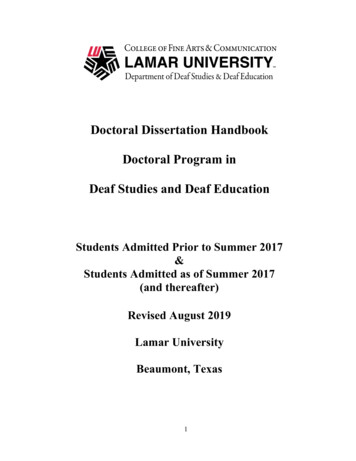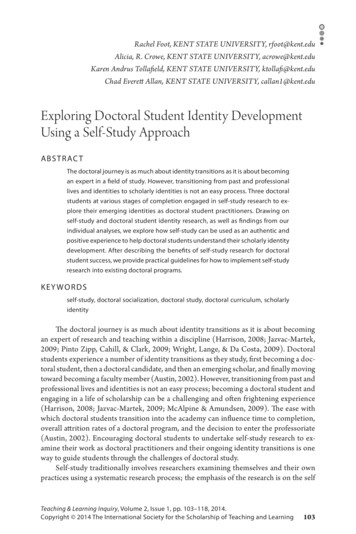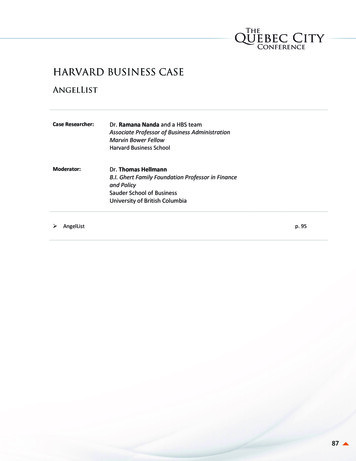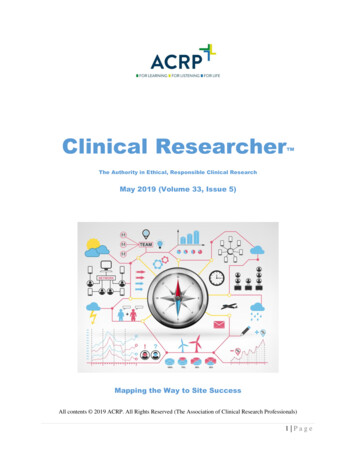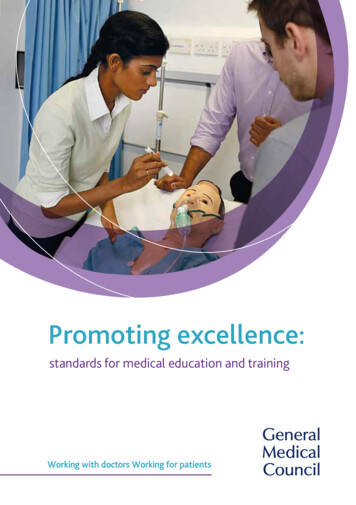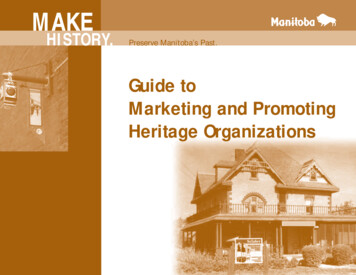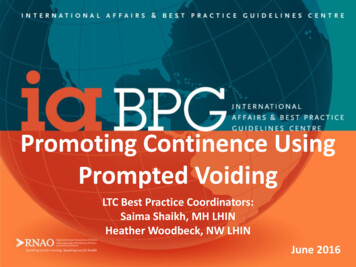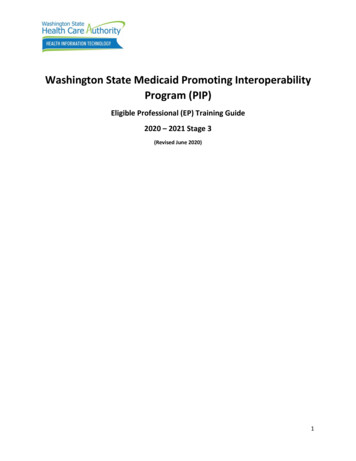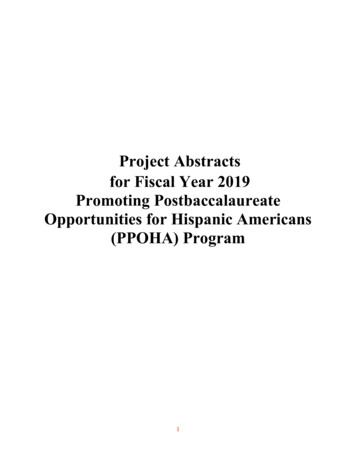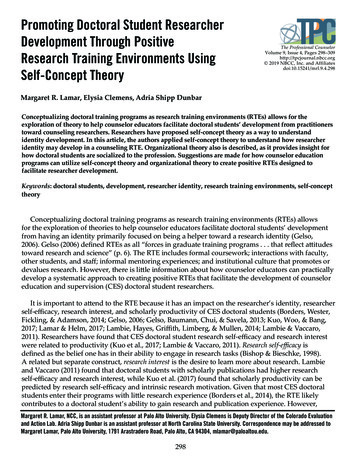
Transcription
Promoting Doctoral Student ResearcherDevelopment Through PositiveResearch Training Environments UsingSelf-Concept TheoryThe Professional CounselorVolume 9, Issue 4, Pages 298–309http://tpcjournal.nbcc.org 2019 NBCC, Inc. and Affiliatesdoi:10.15241/mrl.9.4.298Margaret R. Lamar, Elysia Clemens, Adria Shipp DunbarConceptualizing doctoral training programs as research training environments (RTEs) allows for theexploration of theory to help counselor educators facilitate doctoral students’ development from practitionerstoward counseling researchers. Researchers have proposed self-concept theory as a way to understandidentity development. In this article, the authors applied self-concept theory to understand how researcheridentity may develop in a counseling RTE. Organizational theory also is described, as it provides insight forhow doctoral students are socialized to the profession. Suggestions are made for how counselor educationprograms can utilize self-concept theory and organizational theory to create positive RTEs designed tofacilitate researcher development.Keywords: doctoral students, development, researcher identity, research training environments, self-concepttheoryConceptualizing doctoral training programs as research training environments (RTEs) allowsfor the exploration of theories to help counselor educators facilitate doctoral students’ developmentfrom having an identity primarily focused on being a helper toward a research identity (Gelso,2006). Gelso (2006) defined RTEs as all “forces in graduate training programs . . . that reflect attitudestoward research and science” (p. 6). The RTE includes formal coursework; interactions with faculty,other students, and staff; informal mentoring experiences; and institutional culture that promotes ordevalues research. However, there is little information about how counselor educators can practicallydevelop a systematic approach to creating positive RTEs that facilitate the development of counseloreducation and supervision (CES) doctoral student researchers.It is important to attend to the RTE because it has an impact on the researcher’s identity, researcherself-efficacy, research interest, and scholarly productivity of CES doctoral students (Borders, Wester,Fickling, & Adamson, 2014; Gelso, 2006; Gelso, Baumann, Chui, & Savela, 2013; Kuo, Woo, & Bang,2017; Lamar & Helm, 2017; Lambie, Hayes, Griffith, Limberg, & Mullen, 2014; Lambie & Vaccaro,2011). Researchers have found that CES doctoral student research self-efficacy and research interestwere related to productivity (Kuo et al., 2017; Lambie & Vaccaro, 2011). Research self-efficacy isdefined as the belief one has in their ability to engage in research tasks (Bishop & Bieschke, 1998).A related but separate construct, research interest is the desire to learn more about research. Lambieand Vaccaro (2011) found that doctoral students with scholarly publications had higher researchself-efficacy and research interest, while Kuo et al. (2017) found that scholarly productivity can bepredicted by research self-efficacy and intrinsic research motivation. Given that most CES doctoralstudents enter their programs with little research experience (Borders et al., 2014), the RTE likelycontributes to a doctoral student’s ability to gain research and publication experience. However,Margaret R. Lamar, NCC, is an assistant professor at Palo Alto University. Elysia Clemens is Deputy Director of the Colorado Evaluationand Action Lab. Adria Shipp Dunbar is an assistant professor at North Carolina State University. Correspondence may be addressed toMargaret Lamar, Palo Alto University, 1791 Arastradero Road, Palo Alto, CA 94304, mlamar@paloaltou.edu.298
The Professional Counselor Volume 9, Issue 4much of the early exposure to research in counselor education rests primarily on research coursework,not extracurricular experiences, such as working on a manuscript with a faculty member (Borderset al., 2014). Though some programs provide systematic extracurricular non-dissertation researchexperiences, about half of the CES programs surveyed by Borders et al. (2014) offered no structuredresearch experiences early in the program sequence or relied on doctoral students to create their ownopportunities. Lamar and Helm (2017) found that the RTE, including faculty mentoring and researchexperiences, was an essential part of CES doctoral student researcher identity development. Givenprior findings (Borders et al., 2014; Kuo et al., 2017; Lamar & Helm, 2017; Lambie & Vaccaro, 2011),it seems crucial for CES doctoral faculty to systematically create an RTE that is conducive to CESdoctoral student researcher identity, research self-efficacy, and research interest development.Leadership in the counseling field has stressed the importance of research in furthering the professionby stating that “expanding and promoting our research base is essential to the efficacy of professionalcounselors and to the public perception of the profession” (Kaplan & Gladding, 2011, p. 372). Therefore, itis essential to strengthen the training of future researchers so they are successful at achieving this vision.Thus, there are two primary purposes of this manuscript: 1) propose that the state of research in the fieldof counselor education is a reflection, in part, of an RTE issue; and 2) provide practical ways for programsto facilitate researcher development among doctoral students. The authors provide insight on howself-concept theory and organizational development theory may be a useful means for conceptualizingresearcher development and facilitating change in RTEs.Self-Concept TheorySelf-concept theory provides a framework for conceptualizing the way a person organizes beliefsabout themselves. Purkey and Schmidt (1996) defined self-concept theory as “the totality of a complexand dynamic system of learned beliefs that an individual holds to be true about their personalexperience” (p. 31). Learned beliefs are subjective and not necessarily based on reality but instead arereflections of individuals’ perceptions of themselves. These perceptions are related to past experiencesand expectations about future goals. Purkey and Schmidt (1996) suggested conceptualizing the selfconcept using the following categories: (a) organized, (b) learned, (c) dynamic, and (d) consistent.Discussions of each of these categories are presented in the context of applying self-concept theory toresearcher development.Current counselor training literature has discussed the development of student professionalcounselor identity (e.g., Prosek & Hurt, 2014); however, until recently (e.g., Jorgensen & Duncan,2015; Lamar & Helm, 2017), counseling professional identity literature has not included a focus onhow research is integrated into a student’s identity. Self-concept theory can be used to conceptualizethe inclusion of researcher identity into the professional identity of CES doctoral students.Organization of the Self-ConceptPurkey and Schmidt (1996) used a spiral as a visual representation of how the self is organized(Figure 1). They referred to the sense of self, or overarching view of who you are, as the central I, andplaced it at the very center of the spiral. In addition, people also have other specific identities, or whatPurkey and Schmidt termed me’s, that inform their global identity. These multiple identities can beconsidered hierarchical, meaning that one of the me identities might be more important to a personthan another aspect of their identity and is placed more proximal to the central I on the spiral thanmore distal me’s. Developmentally, it makes sense that a beginning CES doctoral student, for example,may have a stronger counselor me (located closer to their central I), whereas their researcher me might299
The Professional Counselor Volume 9, Issue 4be located closer to the periphery of the spiral. This is confirmed through previous research findingssuggesting that CES students enter doctoral programs with stronger helper identities and integrateresearch into their self-concept throughout their academic experience (Gelso, 2006; Lamar & Helm,2017; Lambie & Vaccaro, 2011). It would be expected that these me’s would be more likely to shiftthroughout the course of a doctoral program with greater exposure to a positive RTE. The relativeimportance of these identities to a doctoral student’s professional identity is illustrated for exemplarypurposes in Figure 1. Faculty have a significant role in creating positive RTEs so that a doctoralstudent’s researcher me can be strengthened and become more fully integrated into their self-concept. To Change:Researcher meSupervisor me* To Stay:Counselor meParent meTeacher meWriter meArtist me To Add:Administrator meTriathalete meFigure 1. Self-Concept SpiralLearning for a LifetimeDeveloping the self-concept is a task that takes a lifetime of learning (Purkey & Schmidt, 1996). Selfconcept learning occurs in three ways: (a) exciting or devastating events, (b) professional helpingrelationships, and (c) everyday experiences. Individually, and in combination, these experiences canreorganize and shape a person’s self-concept. For example, receiving a first decision letter from an editorcan be an exciting or devastating event that influences a doctoral student’s self-concept. Faculty memberscan process and contextualize the experience so a doctoral student’s researcher self-concept is positivelypromoted (e.g., a lengthy revise and resubmit letter can feel overwhelming but is a fantastic outcome;Gelso, 2006; Lamar & Helm, 2017). Similarly, the counseling RTE can promote positive research attitudesfor doctoral students on a daily basis (e.g., displaying examples of student and faculty research).300
The Professional Counselor Volume 9, Issue 4Dynamic and Consistent Self-Concept ProcessesSelf-concept is dynamic; it is constantly changing and has the potential to propel doctoral studentresearchers forward (Purkey & Schmidt, 1996). Change occurs when a doctoral student incorporatesnew beliefs into existing ones. When new information is presented to the doctoral student, contraryto what they currently believe about themselves (e.g., ability to understand the methods section ofan article), they are challenged to merge the new information with their current beliefs (e.g., “I’m aclinician,” and skip to the implications section). As they revise their belief system, they may be able tobehave in new ways (e.g., making connections between the methods section and clinical application orengaging in critical discussions of research). However, reconciling new beliefs about their self-conceptand demonstrating new research skills can be challenging. Consistency is highly valued by doctoralstudents faced with a need to adopt new ideas into their self-concept (Purkey & Schmidt, 1996). Adoctoral student may experience what is commonly known as imposter syndrome, which occurs whena student is unable to internalize their accomplishments and attributes their success to good luck(Parkman, 2016). As CES doctoral students become proficient in research pursuits, they may still havedifficulty seeing themselves as researchers (e.g., articulating hesitancy to share findings with peers orat professional conferences). They might tell others they are a counselor, a teacher, or a supervisor andthey also conduct research, thus distancing that identity from the core of their self-concept (Lamar &Helm, 2017). They may need to repeatedly have their new researcher identity confirmed by faculty andtheir own personal experiences before they can communicate a fully integrated self-concept to others.As learning occurs, the self-concept reorganizes toward a more stable professional identity.Incorporation of a researcher identity into their self-concept is likely to be dynamic, with consistencyincreasing throughout the doctoral students’ academic program. As CES doctoral students move intonew stages of their career, their researcher identity is likely to become a more fixed aspect of theirself-concept.Development of the self-concept occurs in a CES doctoral program, which exists within thelarger academic culture. Doctoral students are initially presented with the challenge of navigatinga new culture. The culture of academe has its own processes, language, and roles. In addition todevelopment of their researcher self-concept, doctoral students also must integrate their roles withinhigher education into their self-concept.Organizational DevelopmentA primary goal of doctoral education is to prepare and acculturate doctoral students to their futureprofessional life as counselor educators (Austin, 2002; Johnson, Ward, & Gardner, 2017; Weidman &Stein, 2003). Many doctoral students in CES programs will pursue a CES faculty position within highereducation organizations. Higher education organizations demonstrate various forms of culture andsocialization processes (Tierney, 1997). University cultural norms include expectations for how to act,what to strive for, and how to define success and failure. Graduate education literature has includeddiscussions on helping doctoral students transition into faculty life and university organizationalculture (e.g., Austin, 2002; Austin & McDaniels, 2006). This socialization process has not beenextensively discussed in the counselor training literature, yet there is potential for it to be useful increating positive RTEs.Socialization Into the AcademySocialization is the process by which doctoral students learn the culture of an institution, includingboth the spoken and unspoken rules (Johnson et al., 2017). The process of socializing doctoral301
The Professional Counselor Volume 9, Issue 4students to graduate school is a part of a greater socialization to higher education (Gardner & Barnes,2007). Weidman, Twale, and Stein (2001) described four stages and characterized three elementsof socialization—knowledge acquisition, investment, and involvement—that are experienced overthe four stages. These stages provide insight for doctoral programs looking to provide intentionalsupport for their students acclimating to the RTE within higher education.Anticipatory stage. Doctoral students begin developing an understanding of the organizationalculture even before they start a program of study (Clarke, Hyde, & Drennan, 2013; Weidman et al.,2001). During recruitment and introduction to the program, doctoral students gather informationabout the program (knowledge acquisition), decide to enroll (investment), and begin to make senseof organizational norms, expectations, and roles (involvement). CES doctoral students are, therefore,entering counseling programs with preconceived ideas about their roles as students, including theirfunction as student researchers.Formal and informal stages. The formal and informal stages co-occur but are differentiated in thatthe formal stage is more faculty or program driven, whereas the informal stage is peer socialization(Gardner, 2008; Weidman et al., 2001). Some of the formal stage methods of socialization can includeclassroom instruction, faculty direction, and focused observation. Courses grounded in the 2016 Councilfor Accreditation of Counseling and Related Educational Programs (CACREP) standards related todoctoral professional identity or research are part of the formal socialization process. Out-of-classroomconversations with faculty and other university staff orient doctoral students to the value of research inthe program and university. Doctoral students learn through faculty direction and observation aboutnetworking at conferences, publishing, and what types of research are considered valuable in thefield. Students also observe faculty working around obstacles to keep their own research active. Theseexamples are all consistent with knowledge acquisition.Informal socialization happens as new doctoral students observe and learn how more advancedstudents and incoming cohorts define norms (Gardner, 2008). This stage has many parallels toexisting research about how faculty acculturate to new organizations. Tierney and Rhoads (1994)proposed new faculty members learn the culture of the organization in mostly informal ways. Asthey observe the established tenured faculty, new faculty learn what is important to the departmentand develop understanding about the institution’s priorities. This acculturation process is importantbecause it is likely to impact the RTE faculty create for doctoral students.Similarly, doctoral students learning about culture, investment, and involvement in research are likelyguided by the knowledge they acquire through observing and engaging with more advanced doctoralstudents in their programs of study (Gardner, 2008; Gelso, 2006). Acquisition of knowledge, occurring“through exposure to the opinions and practices of others also working in the same context” (Mathews &Candy, 1999, p. 49), creates norms among doctoral students. Norms regarding participation in research,such as whether it is done only to meet degree requirements or with more intrinsic motivation, maybe conveyed across cohorts. Lamar and Helm (2017) found CES doctoral students were intrinsicallymotivated by their research when it was connected to their counselor identity and they could see howtheir research would help their clients. Jorgensen and Duncan (2015) identified external facilitators, suchas faculty, coursework, and program expectations, that shaped the researcher identity developmentof master’s counseling students. Faculty communicated the culture of the institution and indirectlycommunicated their own intrinsic motivation, or lack of it, through their research activity. New studentsalso gain insight from advanced doctoral students about the degree to which research should be alignedwith faculty members and the more subtle messages about departmental expectations. For example, is302
The Professional Counselor Volume 9, Issue 4qualitative research supported and valued as much as quantitative? Are certain research methodologiesprioritized by faculty or the institution? The combination of formal and informal socialization leads to anunderstanding of the academic organization and counselor education profession.Personal stage. During this final stage, doctoral students internalize and act upon the role they havetaken within their organization (Gardner, 2008; Weidman et al., 2001). They solidify their professionalidentity at the student level and have, perhaps, begun to integrate their researcher identity into theirself-concept. They also can use the knowledge they have acquired to make purposeful decisions aboutinvestment and involvement in research. Doctoral students make decisions about their course ofstudy and the amount of time dedicated to developing as a researcher compared to other aspects ofcounselor education such as teaching, supervision, and service. In this stage, it is important for facultyto attend to whether doctoral students feel caught in the role they occupy within the program. Somedoctoral students might more quickly adopt research into their self-concept and find opportunitiesto engage in research, while others take longer to develop their researcher identity and might notfind themselves with as many options to get involved in faculty research projects. Additionally, thosestudents’ strong helper identities might make them valuable doctoral-level supervisors or cliniciansthat programs can lean on to train master’s-level students. They may feel stuck in their clinical rolesand miss out on opportunities to gain informal research experience. This is not to diminish doctoralstudents who are primarily interested in a CES degree with the goal of strengthening their clinicalwork. It is the position of these authors that scholarship is an integral part of all clinical work and,therefore, programs should provide equitable opportunities for all doctoral students, regardless oftheir professional goals, to engage in the research
Lamar and Helm (2017) found that the RTE, including faculty mentoring and research experiences, was an essential part of CES doctoral student researcher identity development. Given . throughout the course of a doctoral prog
